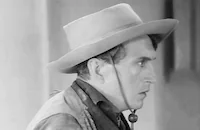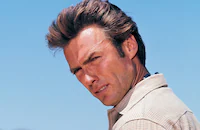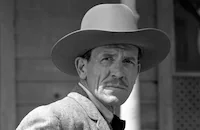Star in the Dust
Brief Synopsis
Cast & Crew
Charles Haas
John Agar
Mamie Van Doren
Richard Boone
Coleen Gray
Leif Erickson
Film Details
Technical Specs

Synopsis
In the late 1800s in the western town of Gunlock, Sheriff Bill Jordan tries to live up to the legacy of his father, tough lawman Tom Jordan, while remaining fully within the limits of the law. One day, gunslinger Sam Hall, who has murdered three farmers, is scheduled to be hanged at sundown. Bill faces opposition from the cattlemen's association, who originally hired Hall and feel they must rescue him; the farmers, who fear that the ranchers will free Hall before sundown; and Nellie Mason, Hall's girl friend. Bill suspects that George Ballard, local banker and head of the cattlemen's association, hired Hall as a killer, but Bill must tread carefully in accusing him, since Ballard is the brother of Bill's fiancée Ellen. Deputy Mike "Mac" MacNamara suggests hanging Hall immediately, but Bill insists on sticking to the legal agreement to hang him at sundown. When Nellie arrives to visit Hall in the jail, he secretly hands her unsigned letters from Ballard, one offering to hire Hall and another that agrees to spring him from jail if he keeps quiet. Hall instructs Nellie to inform Ballard that she will show the letters to Bill if Hall is hanged. At the same time, Bill visits schoolteacher Rigdon, the secret leader of the farmers, and accuses him of wanting to run the town. The two fight, and after Bill wins, he fines himself for disturbing the peace and sets off for the Ballards'. There, Ellen greets him happily despite his worries that she may soon have to take sides between her fiancé and her brother. Nellie arrives at the ranch soon after to tell Ballard about the letters, but after Ballard denies any involvement and Ellen refuses to believe her, Nellie leaves. Ballard explains to Ellen that he was forced to hire Hall to scare the farmers, after Rigdon settled farmers on land south of the creek, immediately fenced off all the best range land and then began trying to take over the ranchers' land north of the creek. He also informs his sister that the cattlemen plan to break Hall out within hours, and fearing for Bill's safety, she agrees to distract him long enough for Ballard to get Hall out of jail peaceably. Ballard, however, goes to Nan Hogan, wife of rancher Lew and former victim of Hall's aggression, and convinces her that Lew wrote the letters hiring Hall and will hang unless the prisoner is sprung. Unaware that Ballard actually wants Bill killed, Nan agrees to bring a gun to Hall. Meanwhile, no one in town will give Bill any information about the farmers' or the ranchers' plans, and Pastor Harris and Doc Quinn warn him that if he does not send for the National Guard, they will fire him. When Bill tries, however, he discovers that the telegraph line has been cut, and soon after, while Bill is arresting rancher Jess Ryman to keep him out of trouble, Nan and Nellie conspire to get Hall the gun. Ellen then calls Bill to the local hotel, giving Hall enough time to knock out Mac and the jailed Ryman to make his escape. When Bill returns to the jail, however, Orval Jones, an older man eager to become a deputy, has captured Hall, and the prisoner is locked up again. Across town, Nan learns that Nellie has the letters and, hoping to clear Lew's name, fights her, seizes them and brings them to Bill. Although Nan, an ex-girl friend of Ballard's, knows the handwriting is his, Bill advises her that her word alone is not enough. Nan then tips off Bill that Ellen was involved in Hall's escape attempt, and believing that Ellen has chosen her brother over him, he denounces her. Informed that the farmers are headed to town to kill Hall, Bill meets them and reasons with them to allow the law to handle Hall's punishment, and although the farmers agree, Rigdon promises to call for them if anything goes wrong during the hanging. Bill then confronts Ballard at the bank, swearing he will not rest until Ballard admits he wrote the letters. Bill knocks out Ballard, but then, realizing that the ranchers are approaching, races to guard the jail. A shootout ensues, during which Orval is shot, grasping his new badge as he dies. The ranchers begin to storm the jail, but are stopped by the arrival of the farmers, and another shootout rages. Meanwhile, Nan informs Ellen that Ballard wrote the letters, and although Ellen rushes to the bank to stop her brother, he knocks her out and climbs onto the roof with a rifle. Bill brings out Hall, threatening to shoot the prisoner himself if anyone tries to stop the hanging, and just as Ballard secretly takes aim at Bill, the ranchers set the gallows on fire. Confusion reigns until Mac brings out Ryman, who reports that Hall confessed that Ballard hired him to kill all three men south of the creek, where they had a right to be, in order to scare the farmers. Lew apologizes to Bill, who leads Hall to a nearby tree and places the noose around his neck. As Nellie sobs, Hall asks the townspeople not to blame her for his sins. Suddenly, Bill sees Ellen on the roof, struggling with Ballard for his gun. When the gun fires, the horse rears, hanging Hall, and Ballard pushes Ellen away, giving Lew room to shoot his former boss down. Finally realizing that Ellen loves him, Bill pulls her into his arms as she weeps for her brother.

Director
Charles Haas
Cast

John Agar

Mamie Van Doren

Richard Boone

Coleen Gray

Leif Erickson

James Gleason

Randy Stuart
Terry Gilkyson

Paul Fix

Harry Morgan
Stuart Randall
Robert Osterloh
Stanley Andrews
John Day
Stafford Repp
Lewis Martin
Renny Mcevoy
Jesse Kirkpatrick
James Parnell
Anthony Jochim

Clint Eastwood

Kenneth Macdonald
Scott Lee
Paul Mcguire
Jack Ingram
Stevie Wootton
Mike Bataran
Jim Brandt
Rickey Murray
Erik Nielsen
Crew
John P. Austin
Oscar Brodney
Leslie I. Carey
William Fritzsche
Russell A. Gausman
Joseph Gershenson
Alexander Golitzen
Corson Jowett
Jay A. Morley Jr.
John L. Russell Jr.
Ed Sandlin
Frank Shaw
Joe Sikorski
Frank Skinner
Ray Snyder
Joan St. Oegger
Alfred Sweeney
Bud Westmore
Albert Zugsmith

Film Details
Technical Specs

Articles
TCM Remembers - John Agar
Popular b-movie actor John Agar died April 7th at the age of 81. Agar is probably best known as the actor that married Shirley Temple in 1945 but he also appeared alongside John Wayne in several films. Agar soon became a fixture in such films as Tarantula (1955) and The Mole People (1956) and was a cult favorite ever since, something he took in good spirits and seemed to enjoy. In 1972, for instance, the fan magazine Famous Monsters of Filmland mistakenly ran his obituary, a piece that Agar would later happily autograph.
Agar was born January 31, 1921 in Chicago. He had been a sergeant in the Army Air Corps working as a physical trainer when he was hired in 1945 to escort 16-year-old Shirley Temple to a Hollywood party. Agar apparently knew Temple earlier since his sister was a classmate of Temple's. Despite the objections of Temple's mother the two became a couple and were married shortly after. Temple's producer David Selznick asked Agar if he wanted to act but he reportedly replied that one actor in the family was enough. Nevertheless, Selznick paid for acting lessons and signed Agar to a contract.
Agar's first film was the John Ford-directed Fort Apache (1948) also starring Temple. Agar and Temple also both appeared in Adventure in Baltimore (1949) and had a daughter in 1948 but were divorced the following year. Agar married again in 1951 which lasted until his wife's death in 2000. Agar worked in a string of Westerns and war films such as Sands of Iwo Jima (1949), Breakthrough (1950) and She Wore a Yellow Ribbon (1949). Later when pressed for money he began making the films that would establish his reputation beyond the gossip columns: Revenge of the Creature (1955), The Brain from Planet Arous (1957), Invisible Invaders (1959) and the mind-boggling Zontar, the Thing from Venus (1966). The roles became progressively smaller so Agar sold insurance and real estate on the side. When he appeared in the 1988 film Miracle Mile his dialogue supposedly included obscenities which Agar had always refused to use. He showed the director a way to do the scene without that language and that's how it was filmed.
By Lang Thompson
DUDLEY MOORE, 1935-2002
Award-winning actor, comedian and musician Dudley Moore died on March 27th at the age of 66. Moore first gained notice in his native England for ground-breaking stage and TV comedy before later building a Hollywood career. Like many of his peers, he had an amiable, open appeal that was balanced against a sharply satiric edge. Moore could play the confused innocent as well as the crafty schemer and tended to command attention wherever he appeared. Among his four marriages were two actresses: Tuesday Weld and Suzy Kendall.
Moore was born April 19, 1935 in London. As a child, he had a club foot later corrected by years of surgery that often left him recuperating in the hospital alongside critically wounded soldiers. Moore attended Oxford where he earned a degree in musical composition and met future collaborators Peter Cook, Jonathan Miller and Alan Bennett. The four formed the landmark comedy ensemble Beyond the Fringe. Though often merely labelled as a precursor to Monty Python's Flying Circus, Beyond the Fringe was instrumental in the marriage of the piercing, highly educated sense of humor cultivated by Oxbridge graduates to the modern mass media. In this case it was the revue stage and television where Beyond the Fringe first assaulted the astonished minds of Britons. Moore supplied the music and such songs as "The Sadder and Wiser Beaver," "Man Bites God" and "One Leg Too Few." (You can pick up a CD set with much of the stage show. Unfortunately for future historians the BBC commonly erased tapes at this period - why? - so many of the TV episodes are apparently gone forever.)
Moore's first feature film was the 1966 farce The Wrong Box (a Robert Louis Stevenson adaptation) but it was his collaboration with Peter Cook on Bedazzled (1967) that's endured. Unlike its tepid 2000 remake, the original Bedazzled is a wolverine-tough satire of mid-60s culture that hasn't aged a bit: viewers are still as likely to be appalled and entertained at the same time. Moore not only co-wrote the story with Cook but composed the score. Moore appeared in a few more films until starring in 10 (1979). Written and directed by Blake Edwards, this amiable comedy featured Moore (a last-minute replacement for George Segal) caught in a middle-aged crisis and proved popular with both audiences and critics. Moore's career took another turn when his role as a wealthy alcoholic who falls for the proverbial shop girl in Arthur (1981) snagged him an Oscar nomination as Best Actor and a Golden Globe win.
However Moore was never able to build on these successes. He starred in a passable remake of Preston Sturges' Unfaithfully Yours (1984), did another Blake Edwards romantic comedy of moderate interest called Micki + Maude (1984, also a Golden Globe winner for Moore), a misfired sequel to Arthur in 1988 and a few other little-seen films. The highlight of this period must certainly be the 1991 series Orchestra where Moore spars with the wonderfully crusty conductor Georg Solti and leads an orchestra of students in what's certainly some of the most delightful television ever made.
By Lang Thompson

TCM Remembers - John Agar
Quotes
Trivia
Notes
The working title of this film was Law Man. According to a February 1955 Los Angeles Examiner news item, Universal originally bought the screen rights to the novel as a vehicle for Joel McCrea. A August 25, 1955 Hollywood Reporter news item adds Rankin Mansfield to the cast, but his appearance in the final film has not been confirmed.

Miscellaneous Notes
Released in United States Summer June 1956
Released in United States Summer June 1956













